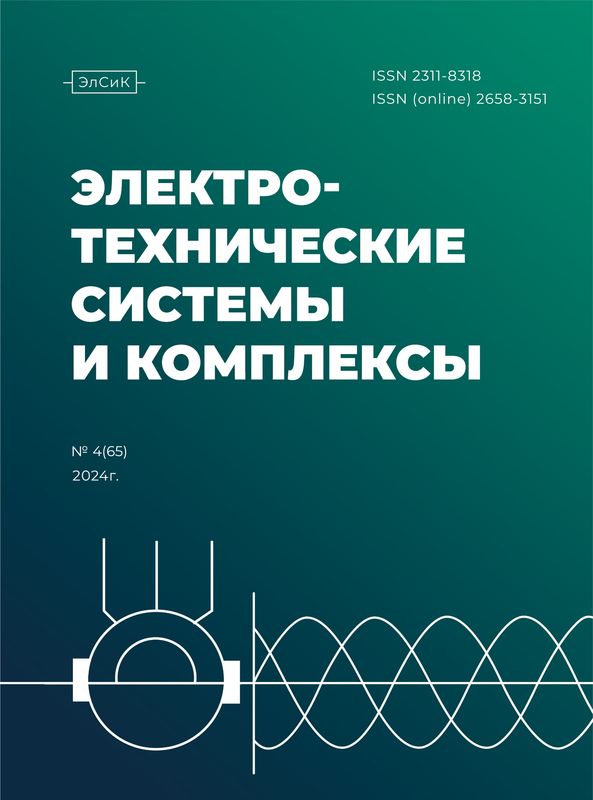Abstract
The resistance of overhead power lines depends to a large extent on the temperature of the conductor. It is known that the current flowing heats the conductor, but the environmental conditions also influence the heat transfer. The classical approach in determining the limiting active power flow over a transmission line does not take into account thermal processes, considering these factors as independent. This, in turn, can lead to errors in determining the allowable power overflow. The paper proposes a method for calculating steady-state conditions with consideration of thermal processes in elements to analyze the stability of power systems. It is shown that the presented method makes it possible to determine with the necessary accuracy the limiting power flow taking into account thermal processes. It is also necessary to refer to the advantages of the method that in addition to traditional technical limitations in the case of heavy modes (voltages, currents) it allows introducing restrictions on the maximum permissible temperature of both transmission lines and transformers. According to the results of the simulation, it was found that the overflow of active power in the limit mode, taking into account thermal processes in the winter period for the considered electrical system amounted to 459.32 MW, which is 190.82 MW more than the overflow without taking into account thermal processes. In the summer period the overflow amounted to 347.29 MW, which is 78.79 MW higher. The results obtained show that thermal processes in the electrical network elements can significantly affect the limit of transmitted power under different climatic factors and seasons. The analysis carried out in the paper emphasizes the need to take into account the thermal balance in the design and operation of electrical networks of different voltage classes.
Keywords
electric power system, permissible power flow, mode weighting, internal temperature correction, thermal balance equation
1. Petrova E.V., Girshin S.S., Krivolapov V.A., Goryunov V.N., Trotsenko V.M. The analysis of continuous admissible currents and active power losses in overhead power lines taking into account climatic factors. Omskij nauchnyj vestnik [Omsk Scientific Bulletin], 2023, no. 4 (188), pp. 84-92. (In Russian). doi: 10.25206/1813-8225-2023-188-84-92
2. Shvedov G.V., Azarov A.N. Improving accuracy of electric power load loss calculations in overhead power lines wires. Elektroenergiya. Peredacha i raspredelenie [Electric power. Transmission and distribution], 2020, no. 2 (59), pp. 36-41. (In Russian)
3. Wang Young., Wang Yan, Dong X., Wang C. Capacity Assessment for Wind-Storage Integration System Considering Electro-Thermal Coupling of Overhead Transmission Line. IEEE Transactions on Power Systems. 2024, vol. 39, no. 1, pp. 967-975. doi: 10.1109/TPWRS.2023.3238992
4. Balametov A.B., Khalilov E.D. Simulation of Electric Networks Modes Using Steady-State and Heat Balance Equations. Energetika. Izvestiya vysshikh uchebnykh zavedenii i energeticheskikh obyedinenii SNG [Energetika. Proceedings of CIS higher education institutions and power engineering associations], 2020, no. 1, pp. 66-80. (In Russian). doi: 10.21122/1029-7448-2020-63-1-66-80
5. Vikharev A.P. Features of temperature monitoring of overhead power transmission lines with insulated wires. Elektricheskie stantsii [Electrical stations], 2019, no. 3 (1052), pp. 27-29. (In Russian). doi: 10.34831/EP.2019.1052.44094
6. Danilov M.I., Romanenko I.G. Determination of power flow and temperature of electrical network wires of the steady-state of the power system. Elektricheskie stantsii [Electrical stations], 2022, no. 7, pp. 25-37. (In Russian). doi: 10.34831/EP.2022.1092.7.005
7. Du Y., Liao Y. On-line estimation of transmission line parameters, temperature and sag using PMU measurements. Electric Power Systems Research. 2012, vol. 93, pp. 39-45. doi: 10.1016/j.epsr.2012.07.007
8. Kubis A., Rehtanz C. Synchrophasor based thermal overhead line monitoring considering line spans and thermal transients. IET Generation, Transmission & Distribution. 2016, vol. 10, no 5, pp. 1232-1239. doi: 10.1049/iet-gtd.2015.0852
9. Teh J., Lai C-M., Muhamad N.A., Ooi C.A., Cheng Y-H., Zainuri M.A.A.M. Prospects of using the dynamic thermal rating system for reliable electrical networks: A review. IEEE Access. 2018, vol. 6, pp. 26765-26778. doi: 10.1109/ ACCESS.2018.2824238
10. Oboskalov V.P., Gerasimenko A.A. Determination of the transmission capacity limit when assessing the balance-sheet reliability of electrical power systems. Elektrichestvo [Elektrichestvo], 2023, no. 7, pp. 6-19. (In Russian). doi: 10.24160/0013-5380-2023-7-6-19
11. Jia X., Sun H., Ma Y., Liu Z., Dong X. Calculation of Available Transmission Capacity of Power Grid Considering the Influence of Environmental Factors. IEEE 6th Information Technology and Mechatronics Engineering Conference (ITOEC), Chongqing, China, 2022, pp. 1843-1847. doi: 10.1109/ITOEC53115.2022.9734295
12. Dong X., Wang C., Yun Z., Han X., Liang J., Wang Y., Zhao P. Calculation of optimal load margin based on improved continuation power flow model. International Journal of Electrical Power & Energy Systems. 2018, vol. 94, pp. 225-233. doi: 10.1016/j.ijepes.2017.07.004
13. Girshin S.S., Shepelev A.O. Development of Improved Methods for Calculating Steady States of Power Systems Taking Into Account the Temperature Dependence of the Resistances of the Overhead Transmission Lines. Power Technology and Engineering. 2020, vol. 54, no. 2, pp. 232-241. doi: 10.1007/s10749-020-01196-w
14. Danilov M.I., Romanenko I.G., Morozova T.F., Demin M.S., Kononova N.N. Comparative analysis of the extreme accuracy in calculations of steady states of power systems with modern software systems. Elektricheskie stantsii [Electrical stations], 2024, no. 3 (1112), pp. 38-45. (In Russian). doi: 10.34831/EP.2024.1112.3.005
15. Shepelev A.O. Analyzing the influence of climatic factors on permissible active power flows in power systems. Izvestiya Vysshikh Uchebnykh Zavedenii. Elektromekhanika [Bulletin of Higher Educational Institutions. Electromechanics], 2024, no. 67(1), pp. 105-114. (In Russian). doi: 10.17213/0136-3360-2024-1-105-114
16. Frank S., Sexauer J., Mohagheghi S. Temperature-Dependent Power Flow. IEEE Transactions on Power System. 2013, vol. 28, no. 4, pp. 4007-4018. doi: 10.1109/TPWRS.2013.2266409
17. ShepelevA.O. Sovershenstvovanie metodov raschyota ustanovivshihsya rezhimov elektroenergeticheskih sistemy s uchyotom temperaturnoi zavisimosti aktivnyh soprotivlenij. Kand. Diss. [Improvement of methods of calculation of steady-state modes of electric power systems taking into account temperature dependence of active resistances. Kand. Diss.]. Omsk, 2021. 188 p.
18. Shvetsov S.Yu., Shepelev A.O. Calculation and analysis of power flow taking into account thermal processes in predicting climatic factors. Materialy VII Vserossiyskoy nauchno-prakticheskoj konferentsii s mezhdunarodnym uchastiem "Aktualnye voprosy energetiki" [Materials of the All-Russian scientific conference with international participation "Topical issues of power engineering"]. Omsk, OmSTU Publ., 2024, pp. 90-95. (In Russian)
Osipov D.S., Tkachenko V.A., Shepelev A.O., Shepeleva E.Yu. Modified Method for Calculating Steady States Taking into Account Thermal Modes of Elements for Stability Analysis of Power Systemsy. Elektrotekhnicheskie sistemy i kompleksy [Electrotechnical Systems and Complexes], 2025, no. 1(66), pp. 4-9. (In Russian). https://doi.org/10.18503/2311-8318-2025-1(66)-4-9










